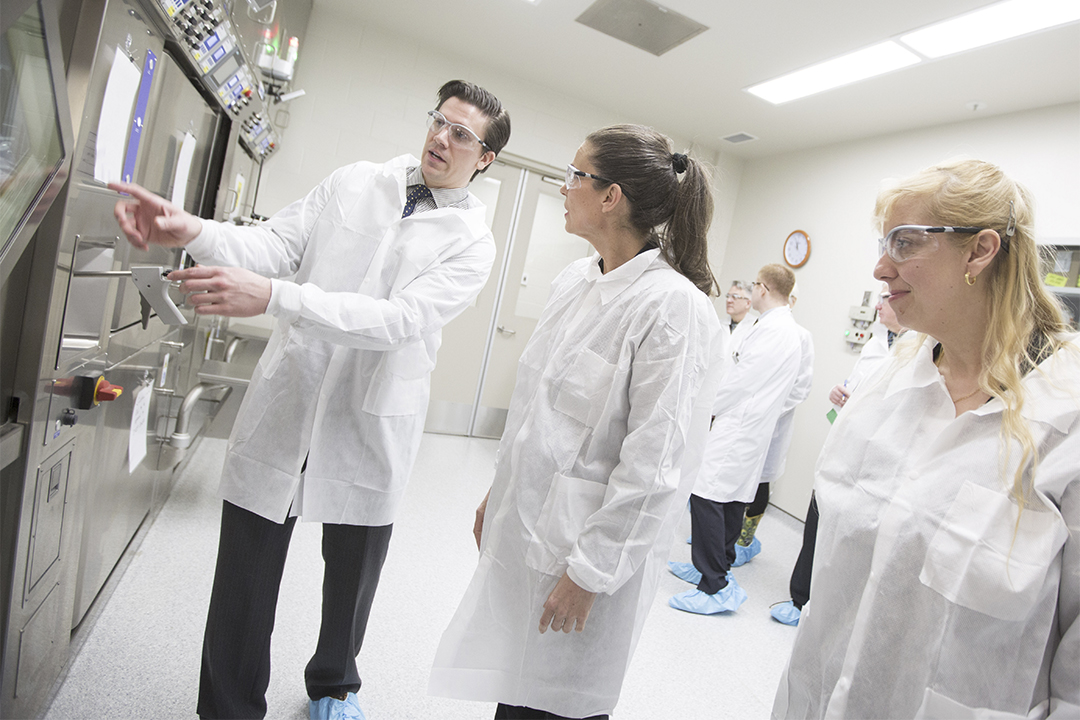
New Canada Research Chair working on “smart” cancer drugs
Eric Price, a new Canada Research Chair (CRC) in Radiochemistry at the University of Saskatchewan, is leading work on developing a new generation of medical imaging technology and “smart” drugs for cancer treatment.
By University CommunicationsSelective in their targeting of cancer, these new drugs hold promise to reduce side effects compared with traditional chemotherapy, said Price, who has been recruited to the U of S chemistry department.
“These new radioactive drugs will be like sniffing dogs,” said Price. “They will be able to select specific cancer cells and kill them, while sparing healthy ones.”
Price’s research will also be applied to addressing the growing problem of bacterial infections that have become resistant to current drug treatments.
Price holds a five-year, $100,000-a-year Tier 2 Chair awarded for the research of exceptional, emerging researchers. His team includes three PhD students, a post-doctoral fellow, and three undergraduate summer students, and plans to expand the team in the future.
Price’s work is supported by new radiochemistry labs at the university’s Saskatchewan Centre for Cyclotron Sciences (SCCS). He also plans to use the university’s Canadian Light Source (CLS) synchrotron for research aimed at finding more effective chelators—molecules that bind to radioactive isotopes and allow for more targeted delivery within the body.
Price was among U of S research scientists and top administrators who met with Canada’s Minister of Science Kirsty Duncan on Wednesday during a tour of the SCCS radiochemistry lab.
Duncan also met new U of S researcher Ekaterina (Kate) Dadachova, who was recently recruited from the Albert Einstein College of Medicine in New York. She holds the Fedoruk Centre for Nuclear Innovation Chair in Radiopharmacy and has also been appointed a professor in the College of Pharmacy and Nutrition.
Dadachova’s laboratory has pioneered new applications of radioimmunotherapy, a treatment mode which had previously been used exclusively in cancer treatment because of the way it delivers radiation directly to cancer cells. Dadachova’s team was able to successfully apply the therapy to treat experimental fungal, bacterial and HIV infections.
Dadachova has also been involved in several projects to create novel materials known as radioprotectors, nature-inspired agents that provide internal and external radiation protection for patients undergoing radiation therapy for cancer.
She also brings with her an active research program in using radioimmunotherapy for treatment of cancers, including melanoma. Preparations are already underway to establish animal and human clinical trials to support that work through a pharmaceutical partner and Royal University Hospital.
She said the university’s life sciences research cluster was one of the main reasons she decided to move her research to the U of S.
“The unique cluster, that includes the cyclotron and radiopharmaceutical production facilities, the Western College of Veterinary Medicine, and Royal University Hospital, is very valuable for translating novel radiopharmaceuticals into animal patients, and eventually into human patients,” she said.
U of S Vice-President Research Karen Chad said the appointments of Price and Dadachova underscore the university’s innovative leadership in cutting-edge nuclear medicine and imaging.
“This exciting research builds upon U of S pioneering work in developing the cobalt-60 technology which revolutionized cancer treatment around the world,” Chad said. “Today, 65 years later, our unique imaging facilities are again supporting cutting-edge research.”
In addition to the new CRC for Price, three other U of S CRCs have recently been renewed, resulting in a total $3.8-million CRC investment for the U of S announced in December. This investment is complemented by funding from the Canada Foundation for Innovation for specialized laboratory equipment. The three researchers with renewed CRC funding are:
- Ajay Dalai, CRC in Bioenergy and Environmentally Friendly Chemical Processing;
- Markus Hecker, CRC in Predictive Aquatic Ecotoxicology; and
- Philip Griebel, CRC in Neonatal Mucosal Immunology.
